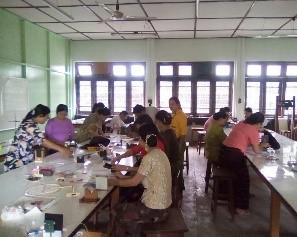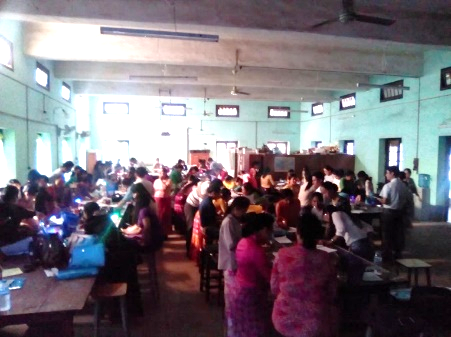In Myanmar, there is a problem that university teaching staff (lecturers and young teachers) who train primary and secondary teachers cannot properly instruct physics experiments. Gifu University worked on the development of a training system for university teaching staff which would guarantee high quality education as 2017 EDU-Port Supported Project “Teacher training system for basic experiment education in Myanmar (Phase 1): Provision of broad knowledge and deep insight through physics experiments”.
Specifically, the project organized and integrated 24 themes of physics experiments into 11, and developed some devices used for several experiments at Yadanabon University, Lashoe University and Mandalay University.
In addition, the project conducted the training on the experiments for 15 lecturers (five each from Mandalay University, Yadanabon University and Meiktila University) who were expected to train other lecturers and young teachers in Myanmar in the future (Photo 1). The trainees worked as assistants at the 3rd National workshop on the Experimental Physics Education (Photo 2) which was held at Magway University in November 2018.
The project invited Deputy President of the University of Meiktila to Japan and introduced the idea that active learning is needed for high quality physics experiments rather than new equipment since graduate students can act as teaching assistants.
In terms of training for young teachers, the Japan-Asia Science Exchange Program in science “Sakura Science Plan” was utilized to invite 12 of them to Japan (Photo 3). The training was also provided with 48 young teachers at Yangon University (Photo 4).
Characteristics of the Japanese-style science teacher training are the basis for a wide range of relevant knowledge through discussions with teachers rather than the submission of experiment reports only. In addition, the teaching assistant system contributes to efficient experiments for undergraduate students, at the same time, graduate students enhance their knowledge by working as teaching assistants.
Japanese-style training for science teachers applied by the project led to strengthening the skills of teaching staff and introducing a teaching assistant system in Myanmar. At the same time, it also provided Japanese side with an opportunity to improve teaching skills. During reporting session on experiments in Myanmar, the satisfaction level of the students was enhanced by involving all students together with a presenter in discussion. After applying the same approach to Gifu University students, the number of successful applicants for regular exams increased.
The two years activity of the 2017 EDU-Port Supported Project are over, but the project will continue to work with the universities in Myanmar to train university teaching staff who can provide high quality education. Eventually, the project would like to work on building a training system for university teachers across Myanmar.

A total of 15 lecturers were trained at Mandalay University, five each from three universities in Mandalay, Yadanabon and Meiktila.

The 3rd National Workshop on the Experimental Physics Education in Myanmar was held at Magway University, and 90 teachers from 35 universities participated in training to learn experiments through active learning.

12 young teachers from 6 universities invited to Gifu University under “Sakura Science Plan” received training on experiments and analysis in Japan.

At the Pre-Training of the 3rd National Workshop on the Experimental Physics Education in Myanmar, 48 young teachers from 9 universities received training on teaching physics experiments.







